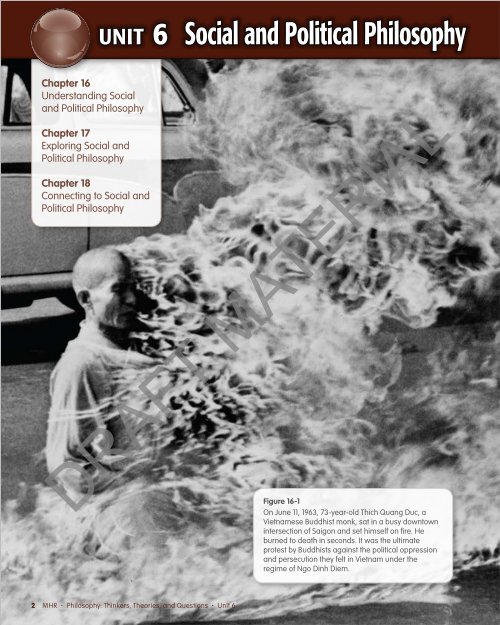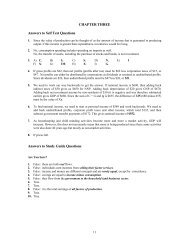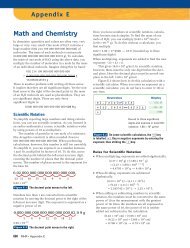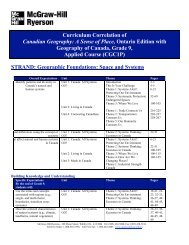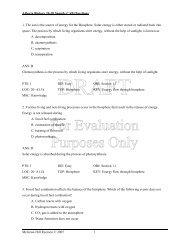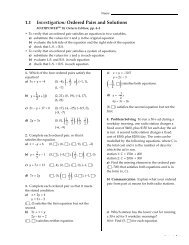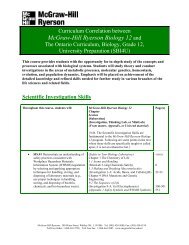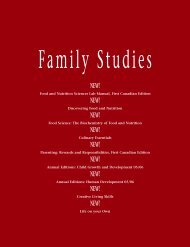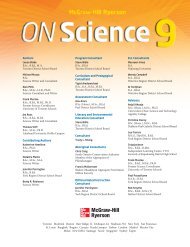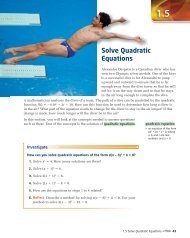UNIT 6 Social and Political Philosophy - McGraw-Hill Ryerson
UNIT 6 Social and Political Philosophy - McGraw-Hill Ryerson
UNIT 6 Social and Political Philosophy - McGraw-Hill Ryerson
You also want an ePaper? Increase the reach of your titles
YUMPU automatically turns print PDFs into web optimized ePapers that Google loves.
u n i t 6 <strong>Social</strong> <strong>and</strong> <strong>Political</strong> <strong>Philosophy</strong><br />
Chapter 16<br />
Underst<strong>and</strong>ing <strong>Social</strong><br />
<strong>and</strong> <strong>Political</strong> <strong>Philosophy</strong><br />
Chapter 17<br />
Exploring <strong>Social</strong> <strong>and</strong><br />
<strong>Political</strong> <strong>Philosophy</strong><br />
Chapter 18<br />
Connecting to <strong>Social</strong> <strong>and</strong><br />
<strong>Political</strong> <strong>Philosophy</strong><br />
DRAFT MATERIAL<br />
Figure 16-1<br />
On June 11, 1963, 73-year-old Thich Quang Duc, a<br />
Vietnamese Buddhist monk, sat in a busy downtown<br />
intersection of Saigon <strong>and</strong> set himself on fire. He<br />
burned to death in seconds. It was the ultimate<br />
protest by Buddhists against the political oppression<br />
<strong>and</strong> persecution they felt in Vietnam under the<br />
regime of Ngo Dinh Diem.<br />
2 mhr • <strong>Philosophy</strong>: Thinkers, Theories, <strong>and</strong> Questions • Unit 6
Unit Expectations<br />
By the end of this unit, you will be able to<br />
• summarize the main questions, philosophers, <strong>and</strong> schools of<br />
philosophy of social <strong>and</strong> political philosophy<br />
• evaluate responses to the main questions <strong>and</strong> theories of social <strong>and</strong><br />
political philosophy expressed by some major philosophers <strong>and</strong> schools<br />
of philosophy<br />
• demonstrate the relevance of questions <strong>and</strong> theories of social <strong>and</strong><br />
political philosophy to everyday life, to other areas of philosophy, <strong>and</strong><br />
to other subject areas<br />
• apply philosophical reasoning skills to develop <strong>and</strong> express your own<br />
ideas about issues in social <strong>and</strong> political philosophy<br />
Unit 1 Unit 2 Unit 3 Unit 4 Unit 5 Unit 6 Unit 7<br />
When do citizens have a responsibility to obey the law, <strong>and</strong> when<br />
are they justified in protesting against their government.<br />
Although disturbing, the practice of suicide as a means of protest forces<br />
us to consider the importance of rights <strong>and</strong> freedoms, <strong>and</strong> the lengths to<br />
which people are willing to go to secure their rights <strong>and</strong> freedoms. How<br />
do you feel about suicide as a form of political protest Is it effective,<br />
or is it excessive How do you think a government should respond to<br />
political protests<br />
Is it a human power or a divine power that invests a government with<br />
authority By what right does a government retain control over the people,<br />
justifying its power Who should control the economy: the government or<br />
the market Should society ensure that wealth is distributed equally If so,<br />
how should this be done These are some of the questions you will explore<br />
in this unit, through the writings of political philosophers <strong>and</strong> activists<br />
working for either social conservation or social change.<br />
Your unit challenge<br />
DRAFT MATERIAL<br />
Your challenge for this unit is to develop a question about social<br />
<strong>and</strong> political philosophy that you would like to have answered.<br />
Write an answer to your question, based on your knowledge at<br />
this point in the course. When you have completed Unit 6: <strong>Social</strong><br />
<strong>and</strong> <strong>Political</strong> <strong>Philosophy</strong>, answer your question again, based<br />
on what you have learned in the unit. Then compare your new<br />
answer with your original answer. How has your answer changed<br />
MHR • <strong>Philosophy</strong>: Thinkers, Theories, <strong>and</strong> Questions • Chapter 16 3
C H 16<br />
Underst<strong>and</strong>ing <strong>Social</strong> <strong>and</strong> <strong>Political</strong> <strong>Philosophy</strong><br />
Key Terms<br />
anarchism<br />
authoritarianism<br />
capitalism<br />
communism<br />
conservatism<br />
democracy<br />
egalitarianism<br />
fascism<br />
liberalism<br />
natural law<br />
political philosophy<br />
religious universalism<br />
social philosophy<br />
socialism<br />
social contract<br />
totalitarianism<br />
utopianism<br />
Aristotle<br />
384−322<br />
Chapter Expectations<br />
By the end of this chapter, you will be able to<br />
• demonstrate an underst<strong>and</strong>ing of the main questions of social <strong>and</strong><br />
political philosophy<br />
• summarize the positions of the major philosophers <strong>and</strong> schools of<br />
philosophy in social <strong>and</strong> political philosophy<br />
Figure 16-2<br />
A protest against the G-20 Summit in Toronto, during the<br />
summer of 2010, turned violent as masked demonstrators<br />
stomped on a police vehicle. What are the limits to<br />
freedom of expression<br />
DRAFT MATERIAL<br />
Avicenna<br />
981−1037<br />
Niccolò Machiavelli<br />
1469−1527<br />
Thomas Hobbes<br />
1588−1679<br />
FPO<br />
Plato<br />
427−347 BCE<br />
Abu Nasr al-Farabi<br />
870−950 CE<br />
St. Thomas Aquinas<br />
1224−1274<br />
Thomas More<br />
1478−1535<br />
John Locke<br />
1632−1704<br />
4 mhr • <strong>Philosophy</strong>: Thinkers, Theories, <strong>and</strong> Questions • Unit 6
Unit 1 Unit 2 Unit 3 Unit 4 Unit 5 Unit 6 Unit 7<br />
Chapter Introduction<br />
<strong>Social</strong> philosophy <strong>and</strong> political philosophy do not exist in a vacuum; they<br />
are influenced by the historical, cultural, <strong>and</strong> religious forces of a nation.<br />
These forces shape the ideologies, policies, <strong>and</strong> structure of the nation’s<br />
social <strong>and</strong> political institutions. To live together in peace, humans must<br />
follow a system of rules that is intended to provide security, equality,<br />
<strong>and</strong> justice.<br />
Although social philosophy <strong>and</strong> political philosophy are often<br />
examined as one, there is a key difference between them. <strong>Social</strong><br />
philosophy explores the relationships between people <strong>and</strong> political<br />
institutions. It addresses government regulations that affect society,<br />
such as social welfare, labour policies, <strong>and</strong> equal opportunity laws.<br />
<strong>Political</strong> philosophy explores the ideal type of government <strong>and</strong> looks<br />
at where power resides (for example, the church or the state, the<br />
monarch or the legislature). It explores the concepts of justice, rights,<br />
<strong>and</strong> regulations. It often focuses on what ought to be the case, instead<br />
of chronicling what is the case: What is the ideal government Should<br />
all people be treated equally regardless of race, creed, or gender<br />
How much freedom should an individual enjoy without government<br />
interference or limitation What rights <strong>and</strong> responsibilities should<br />
citizens have in a well-governed state <strong>Political</strong> philosophy also focuses<br />
on meaning: What do justice <strong>and</strong> freedom mean Do the meanings<br />
of justice <strong>and</strong> freedom allow everyone to enjoy them equally In this<br />
chapter, you will explore the answers to these questions as you examine<br />
how political philosophy is woven into the fabric of our lives.<br />
Jean-Jacques Rousseau<br />
1712−1778<br />
Karl Marx<br />
1818−1883<br />
Mahatma Moh<strong>and</strong>as<br />
Karamch<strong>and</strong> G<strong>and</strong>hi<br />
1869−1948<br />
Nelson M<strong>and</strong>ela<br />
1918−<br />
Injustice anywhere<br />
is a threat to justice<br />
everywhere.<br />
—Martin Luther King Jr.<br />
DRAFT MATERIAL<br />
FPO<br />
“<br />
FPO<br />
”<br />
Frantz Fanon<br />
1925−1961<br />
Mary Wollstonecraft<br />
1759−1797<br />
Friedrich Engels<br />
1820−1895<br />
Sarvepalli<br />
Radhakrishnan<br />
1888−1975<br />
John Rawls<br />
1921–2002<br />
MHR • <strong>Philosophy</strong>: Thinkers, Theories, <strong>and</strong> Questions • Chapter 16 5
Figure 16-3<br />
This diagram shows the<br />
structure of Plato’s ideal<br />
state. How might Plato’s<br />
social structure invite<br />
criticism<br />
The wise ruler<br />
also known as the<br />
philosopher-king<br />
The soldiers who<br />
defend <strong>and</strong> police<br />
the state<br />
also known as the<br />
guardians<br />
The workers who<br />
provide goods <strong>and</strong><br />
services<br />
merchants<br />
Unit 6: <strong>Social</strong> <strong>and</strong> <strong>Political</strong> <strong>Philosophy</strong><br />
Chapter 16: Underst<strong>and</strong>ing <strong>Social</strong> <strong>and</strong> <strong>Political</strong> <strong>Philosophy</strong><br />
The Ideal State: What Philosophers<br />
Have Said<br />
Philosophers have long questioned the nature of political power <strong>and</strong><br />
explored the concept of the ideal state. Why do states exist, <strong>and</strong> what<br />
limits should be placed on their power How should a society be<br />
structured, <strong>and</strong> who should rule What is the purpose of a political<br />
community, <strong>and</strong> how can we attain justice <strong>and</strong> happiness In this<br />
section, you will look at how various philosophers over the last 2000<br />
years have tried to answer these questions.<br />
Ancient Greek Philosophers<br />
In the Republic, Plato (427–347 BCE) presented his idea of a just state:<br />
one that is organized into levels. As shown in Figure 16-3, each level<br />
corresponds to a type of metal, with gold at the top. This hierarchy<br />
reflects Plato’s belief that if the people in each class worked to fulfill their<br />
natural skills <strong>and</strong> talents, order would be achieved in society. Justice<br />
would also be achieved, in the sense that everyone would be working to<br />
their full potential for the common good. Maintaining order, at the head<br />
of Plato’s ideal state, is the philosopher-king, a wise person who rules with<br />
reason, courage, <strong>and</strong> moderation. He or she is responsible for reigning in<br />
the animal passions or greed that threaten to undermine social order. In<br />
Plato’s Republic, Socrates describes the ideal state as an analogy. Justice<br />
in the Republic, he argues, is a suitable model for justice in the soul<br />
because both require balance between rational <strong>and</strong> animal elements.<br />
Human justice involves wisdom, courage, <strong>and</strong> moderation, which<br />
includes knowing one’s proper place in society.<br />
Unlike Plato, Aristotle (384–322 BCE) was concerned with which type<br />
of government—monarchy, aristocracy, or democracy—would best serve<br />
the common good. He believed that each type of government has its<br />
advantages, but there is not one supreme system that suits every society.<br />
Although he believed that democracy—rule by the people—would work<br />
under certain circumstances, he cautioned that this type of governance<br />
could lead to chaos if the majority of citizens were unreasonable or<br />
ignorant. Aristotle’s collection of ideas, published as lecture notes in<br />
Politics, emphasizes that those who are in power need to consider the<br />
interests of everyone—except women, slaves, <strong>and</strong> children, who have no<br />
role in politics. According to Aristotle, the political community revolves<br />
around the polis, or city-state. Men can gather in the polis to exchange<br />
their logos (reasoned speech) <strong>and</strong> engage in praxis (cooperative action)<br />
for the advancement of ideas <strong>and</strong>, ultimately, the improvement of society.<br />
DRAFT MATERIAL<br />
artisans<br />
farmers<br />
6 mhr • <strong>Philosophy</strong>: Thinkers, Theories, <strong>and</strong> Questions • Unit 6
Persian Philosophers<br />
Aristotle’s ideas on government were far-reaching. The Persian<br />
philosopher Abu Nasr al-Farabi, (870–950) was a voracious reader of<br />
Unit 1 Unit 2 Unit 3 Unit 4 Unit 5 Unit 6 Unit 7<br />
Aristotle’s work. As one of the early political philosophers of Islam, he<br />
promoted the idea of a “virtuous city” in his book The Virtuous City. In<br />
a virtuous city, the goal of all citizens, including the king, would be to<br />
cooperate with one another <strong>and</strong> cultivate each other’s virtues, as well<br />
as maintain these virtues in proportion to the golden mean: not too<br />
courageous so as to risk needless defeat in foreign wars, nor too afraid<br />
to defend the state against invaders. Al-Farabi believed that people have<br />
their own unique skills <strong>and</strong> talents, which they should develop to the<br />
highest ability in order to achieve happiness. Al-Farabi’s qualities of the<br />
ideal king—a virtuous <strong>and</strong> intellectual philosopher—resemble those of<br />
Plato’s philosopher-king.<br />
Abu Ali al-Hussain Ibn Sīnā, also known as Avicenna, (981–1037) was<br />
another Persian philosopher who was influenced by Aristotle's ideas<br />
regarding the state. In The Book of Healing, he focused on the community,<br />
more specifically the city-state, for ensuring order. He described the idea<br />
of the “just city,” which would provide the material necessities of survival<br />
for its citizens, resulting in social harmony. Avicenna departed from Plato’s<br />
idea of the philosopher-king as the ideal ruler. In his opinion, the state<br />
would best be served by a leader who possessed more practical traits, such<br />
as common sense <strong>and</strong> effective political control. In Realism <strong>and</strong> Idealism<br />
in Avicenna’s <strong>Political</strong> <strong>Philosophy</strong>, Miriam Galston describes Avicenna’s<br />
ideal ruler as follows: “The determining factor here is superiority of<br />
practical judgment <strong>and</strong> excellence in political management...”<br />
Medieval Philosophers<br />
After Avicenna’s ideas were translated into Latin, he gained prominence<br />
among some medieval European philosophers. During the Middle Ages,<br />
the relationship between the church <strong>and</strong> the state was a central concern<br />
of social <strong>and</strong> political philosophers in Europe. At this time, the ideas of<br />
Thomas Aquinas (1224–1274), an influential Dominican Italian priest <strong>and</strong><br />
theologian, were prominent. Aquinas focused on the idea of one ruler,<br />
whose supreme authority was a God-given right. He justified the Church’s<br />
role as the higher political authority because of natural law: the concept of<br />
a universal, eternal, <strong>and</strong> natural force. According to Aquinas, God reflects<br />
natural law <strong>and</strong> His word forms the basis of people’s morality. A ruler who<br />
followed the natural hierarchy of order would legitimately rule, provided<br />
that he cared for the “common good” <strong>and</strong> was not a tyrant who put his own<br />
interests before those of the people. Aquinas describes this type of ruler in<br />
his work On Princely Government: “When government is unjustly exercised<br />
Figure 16-4<br />
Avicenna is also known for<br />
his work as a physician.<br />
DRAFT MATERIAL<br />
MHR • <strong>Philosophy</strong>: Thinkers, Theories, <strong>and</strong> Questions • Chapter 16 7
Unit 6: <strong>Social</strong> <strong>and</strong> <strong>Political</strong> <strong>Philosophy</strong><br />
Chapter 16: Underst<strong>and</strong>ing <strong>Social</strong> <strong>and</strong> <strong>Political</strong> <strong>Philosophy</strong><br />
by one man who seeks personal profit from his position instead of the good<br />
What is your idea of the of the community subject to him, such a ruler is called a tyrant.”<br />
ideal political state How Englishman Thomas More (1478–1535) was a lawyer by training but<br />
does it compare with worked as<br />
MATERIAL<br />
a Lord Chancellor for King Henry VIII. He proposed an ideal<br />
More’s Utopia society based on mutual cooperation, communally-held property, <strong>and</strong><br />
abundant leisure time for people to enrich their lives. In his work Utopia,<br />
published in 1516, More detailed his vision for a shift in governance<br />
from a system based on greed <strong>and</strong> self-interest to one based on sharing<br />
<strong>and</strong> mutual interest. His concept of the ideal political state is known<br />
as utopianism (from the Greek ou, meaning “no,” <strong>and</strong> topos, meaning<br />
“place”). More’s contributions to social <strong>and</strong> political philosophy were<br />
short-lived, however. King Henry VIII chopped off More’s head when he<br />
did not recognize the King’s divorce <strong>and</strong> new title as head of the Church<br />
of Engl<strong>and</strong>. At his execution, More joked that his beard did not deliver<br />
harm <strong>and</strong> should be spared from being part of the chopping. More was<br />
later made a saint by the Roman Catholic Church.<br />
In contrast to Aquinas’s <strong>and</strong> More’s Christian ideas of an ideal society,<br />
which emphasized the common good <strong>and</strong> mutual interest, Italian<br />
philosopher Niccolò Machiavelli (1469–1527) focused on self-interest <strong>and</strong><br />
the cultivation of a person's virtu—personality traits required to achieve<br />
<strong>and</strong> maintain power—as guiding principles. Machiavelli was a well-known<br />
philosopher, who was very active behind the scenes in the politics of the<br />
Figure 16-5<br />
Florentine republic. His short but influential work, The Prince (1513),<br />
An illustration of More’s defined a successful ruler as one who puts his morality aside in favour of<br />
isl<strong>and</strong> of Utopia<br />
achieving political gain. In The Prince, Machiavelli explains that a successful<br />
ruler must do whatever it takes to hold on to power <strong>and</strong> govern effectively,<br />
even if this means breaking moral codes: “…he must be mentally prepared<br />
to act as circumstances <strong>and</strong> changes in fortune require. …he should do<br />
what is right if he can; but he must be prepared to do wrong if necessary.”<br />
1. Plato’s <strong>and</strong> Aristotle’s philosophies of the ideal state reflect<br />
the time period in which they lived.<br />
a) What assumptions about gender, human rights, <strong>and</strong><br />
intellectual capabilities did they make How did their<br />
assumptions influence their ideas<br />
b) Do their ideas continue to exist in various parts of the<br />
Figure 16-6<br />
world If so, explain where <strong>and</strong> how.<br />
How does this cartoon<br />
2. In your opinion, does the church have a higher authority<br />
illustrate Machiavelli’s<br />
philosophy on achieving<br />
than the state, or should society keep the church <strong>and</strong> the<br />
powerDRAFT<br />
political state separate Explain your answer.<br />
8 mhr • <strong>Philosophy</strong>: Thinkers, Theories, <strong>and</strong> Questions • Unit 6
Individual Freedom<br />
<strong>and</strong> State Interference<br />
Unit Philosophers 1 Unit at different 2 points Unit in history, 3<strong>and</strong> in Unit various parts 4 of the Unit 5 Unit 6 Unit 7<br />
world, have reflected on the relationship between the individual <strong>and</strong><br />
the state. Who is more important: the individual or the community<br />
How much freedom should the individual give up for the benefit of<br />
living in a peaceful society What limits, if any, should be placed on the<br />
state’s power Two 17th century English philosophers, Thomas Hobbes<br />
(1588–1679) <strong>and</strong> John Locke (1632–1704), had very different views on<br />
the authority of the state. Hobbes did not believe in limiting the state’s<br />
power if this meant maintaining social order. Locke believed that if the<br />
state interfered with people’s natural rights, people had the right to rebel<br />
against the state.<br />
The <strong>Social</strong> Contract<br />
In 17th century Engl<strong>and</strong>, the civil war between parliament <strong>and</strong> the<br />
monarchy helped to shape the political ideas of Thomas Hobbes <strong>and</strong> John<br />
Locke. Both supported the idea of a social contract between the people<br />
<strong>and</strong> the state, but for different reasons. A social contract involves the<br />
individual giving up some of his or her freedoms to the state in order to<br />
attain <strong>and</strong> preserve social harmony.<br />
Thomas Hobbes argued that a social contract is necessary because of<br />
the evil nature of humans. He advocated the need for a ruler because<br />
human beings are naturally selfish <strong>and</strong> animalistic in their instinct for<br />
self-preservation. Hobbes believed that if people had complete freedom,<br />
without rules or a ruler to establish order, they would harm anyone who<br />
threatened their well-being. This would result in total chaos. In his book<br />
Leviathan, Hobbes explains that without a ruler, people’s lives would<br />
remain “solitary, poor, nasty, brutish, <strong>and</strong> short.” The supreme ruler, or<br />
“the great Leviathan,” as coined by Hobbes, would reflect the “plurality<br />
of voices, unto one will,” subjecting the people’s “judgement to [the<br />
ruler’s] judgement” for the ruler to maintain peace <strong>and</strong> order effectively.<br />
According to Hobbes, if the community transfers its rights to the ruler,<br />
the Leviathan can hold absolute <strong>and</strong> supreme control over the people.<br />
John Locke countered Hobbes’s view of the Leviathan <strong>and</strong> the absolute<br />
authority of the state. He believed that people hold natural rights of life,<br />
liberty, <strong>and</strong> property. (The Constitution of the United States rephrases<br />
“property” more generally as “the pursuit of happiness.”) According to<br />
Locke, the state can justify its authority only if it protects these rights.<br />
In The Second Treatise of Civil Government (1690), Locke’s premise<br />
of the social contract focuses on the mutual obligation between the<br />
government <strong>and</strong> its subjects: the government protects the rights of its<br />
Figure 16-7<br />
Thomas Hobbes’s Leviathan<br />
depicts government as<br />
a giant reigning in the<br />
otherwise lawless people.<br />
DRAFT MATERIAL<br />
MHR • <strong>Philosophy</strong>: Thinkers, Theories, <strong>and</strong> Questions • Chapter 16 9
Unit 6: <strong>Social</strong> <strong>and</strong> <strong>Political</strong> <strong>Philosophy</strong><br />
Chapter 16: Underst<strong>and</strong>ing <strong>Social</strong> <strong>and</strong> <strong>Political</strong> <strong>Philosophy</strong><br />
“<br />
Figure 16-8<br />
Jean-Jacques Rousseau’s<br />
The <strong>Social</strong> Contract <strong>and</strong><br />
Emile, or On Education,<br />
written in the same year<br />
(1762), were inspirations for<br />
the French Revolution. They<br />
were such popular texts<br />
that people rented them by<br />
the hour.<br />
FPO<br />
Liberty, equality,<br />
fraternity.<br />
—slogan of the<br />
French Revolution, on<br />
which liberal democracies<br />
are founded<br />
”<br />
subjects, <strong>and</strong> the subjects reciprocate by obeying the government’s laws.<br />
The government’s rule remains firm as long as the government upholds<br />
the protection of the rights <strong>and</strong> laws that were made in accordance with<br />
the people’s consent; if the government violates these rights <strong>and</strong> laws,<br />
the people can form a new government. The exception to this contract<br />
is non-l<strong>and</strong>owners, who cannot enjoy this protection. How does Locke’s<br />
restriction to l<strong>and</strong>owners resemble Plato’s division of social classes<br />
Another philosopher who supported the social contract theory was<br />
the Swiss-born Jean-Jacques Rousseau (1712–1778), whose book The<br />
<strong>Social</strong> Contract opens as follows: “L’homme est né libre, et partout il est<br />
dans les fers” or “Man is born free, <strong>and</strong> is everywhere in chains.” Unlike<br />
Hobbes, Rousseau believed that evil <strong>and</strong> misery come from society,<br />
not from people, whose nature is essentially good. In the same book,<br />
Rousseau explains that it is in everyone’s interest to enter into a social<br />
contract—to compromise some of his or her rights in order to enjoy<br />
the benefits of the state: “Each of us puts his person <strong>and</strong> all his power<br />
in common under the supreme direction of the general will, <strong>and</strong>, in our<br />
corporate capacity, we receive each member as an indivisible part of<br />
the whole.” Rousseau argued that the existence of the state is justified<br />
because it represents what is best for the community—a concept that he<br />
called the general will. The state underst<strong>and</strong>s <strong>and</strong> respects the general<br />
will <strong>and</strong> applies it for the benefit of everyone. The actions of those who<br />
defy the general will are not tolerated because they are harmful to the<br />
social contract <strong>and</strong> to themselves.<br />
Conservatism <strong>and</strong> Liberalism<br />
<strong>Social</strong> <strong>and</strong> political philosophies often develop as a response to their<br />
historical context: the political, social, cultural, <strong>and</strong> economic setting<br />
during which they emerge. In 1814, a new political philosophy, called<br />
conservatism, emerged as a reaction to the radical political upheaval of<br />
the French Revolution (1789–1799). Conservatism promotes the idea that<br />
political change should take place gradually through reasoned analysis, as<br />
opposed to violence. It emphasizes the preservation of traditional values<br />
<strong>and</strong> institutions. Edmund Burke (1729–1797), an Irish-born philosopher,<br />
criticized the forceful <strong>and</strong> violent protests that characterized the French<br />
Revolution. In 1790, he published Reflections on the Revolution in France,<br />
a work that emphasized reasoned dialogue between the state <strong>and</strong> “those<br />
who are living, those who are dead <strong>and</strong> those who are to be born.” Burke<br />
believed that society is built on the traditions <strong>and</strong> customs h<strong>and</strong>ed down<br />
by previous generations <strong>and</strong> that established institutions, such as the<br />
monarchy <strong>and</strong> the Church, are what hold society together. He<br />
emphasized the rights of the community over those of the individual.<br />
DRAFT MATERIAL<br />
10 mhr • <strong>Philosophy</strong>: Thinkers, Theories, <strong>and</strong> Questions • Unit 6
Countering conservatism is the philosophy of liberalism, which<br />
emphasizes the freedom of the individual, with minimal government<br />
constraints. The British philosopher John Stuart Mill (1806–1873)<br />
Unit championed 1 Unit liberalism 2in his work Unit On Liberty 3 (1859). Unit Mill 4did not believe Unit 5 Unit 6 Unit 7<br />
in government interference, except to protect citizens from physical or<br />
moral harm. For example, if a parent were unable to provide food or<br />
education for his or her child, the state would have a moral obligation to<br />
step in <strong>and</strong> provide for the child.<br />
Aside from the state’s moral obligation, Mill presses for the individual’s<br />
full freedom of expression, thought, feeling, <strong>and</strong> pursuit in order to gain<br />
knowledge <strong>and</strong> truth. Being able to exchange ideas without state<br />
interference or coercion means that people can seek truth, which<br />
ultimately leads to the progress of humankind.<br />
“…the peculiar evil of silencing the expression of an opinion is, that it<br />
is robbing the human race…If the opinion is right, they are deprived<br />
of the opportunity of exchanging error for truth; if wrong, they lose,<br />
what is almost as great a benefit, the clearer perception <strong>and</strong> livelier<br />
impression of truth, produced by its collision with error.”<br />
Unlike Aristotle <strong>and</strong> Locke, Mill believed that women have rights. He<br />
circulated a petition defending the equal rights of women.<br />
Extremes of State Authority<br />
When there are few or no limits to state authority, people are more<br />
vulnerable to government interference <strong>and</strong> reduced protection of their<br />
rights. Moreover, complete authority by the state often leads to abuse<br />
of power <strong>and</strong> the loss of individual freedom. In Canada, protection<br />
against absolute, unchecked government authority is entrenched in the<br />
constitution. For example, Article 9 of Canada’s Charter of Rights <strong>and</strong><br />
Freedoms restricts police authority <strong>and</strong> its powers of arbitrary arrest or<br />
detention. However, people in other parts of the world are not protected<br />
by the checks <strong>and</strong> balances of a democratic political system <strong>and</strong> are ruled<br />
by governments who represent extremes of political philosophy.<br />
Totalitarianism is a form of government that is led by a dictator. A<br />
dictator is a leader who dem<strong>and</strong>s complete obedience from the people,<br />
negating their individual rights in the process. Central to the totalitarian<br />
philosophy is a state that regulates all resources <strong>and</strong> all political <strong>and</strong><br />
social matters. The dictator exercises complete control over all the people<br />
<strong>and</strong> uses military force to subdue any challenges to state authority <strong>and</strong><br />
to reinforce his or her power. Freedom of expression is not tolerated, as<br />
censorship is the norm. Can you think of any examples of totalitarianism<br />
in the world today<br />
one person with a<br />
belief<br />
is equal to a<br />
force of ninety-nine<br />
who have only<br />
interest.<br />
Figure 16-9<br />
What is the meaning of this<br />
quote by John Stuart Mill<br />
Translate it into your own<br />
words.<br />
DRAFT MATERIAL<br />
MHR • <strong>Philosophy</strong>: Thinkers, Theories, <strong>and</strong> Questions • Chapter 16 11
Unit 6: <strong>Social</strong> <strong>and</strong> <strong>Political</strong> <strong>Philosophy</strong><br />
Chapter 16: Underst<strong>and</strong>ing <strong>Social</strong> <strong>and</strong> <strong>Political</strong> <strong>Philosophy</strong><br />
Figure 16-10<br />
A classic anarchist slogan<br />
Similar to totalitarianism, authoritarianism is a form of government<br />
in which the ruler possesses absolute control <strong>and</strong> exercises arbitrary<br />
rule over the people. Citizens must completely submit to the ruler,<br />
for fear of meeting their fate at the h<strong>and</strong>s of a brutal military regime.<br />
Individual freedoms <strong>and</strong> rights are severely restricted under the heavy<br />
h<strong>and</strong> of authoritarianism. Fascism, a reflection of authoritarianism, is<br />
characterized by extreme nationalism led by an exalted ruler, complete<br />
censorship of the press, <strong>and</strong> a strong military that would use violence<br />
to achieve its ends. A fascist state is founded on a rigid class society,<br />
based on a hierarchical model: labourers, farmers, professionals, <strong>and</strong> the<br />
military. Do you know of any examples of authoritarianism or fascism in<br />
the world today or in the past<br />
Anarchism is the opposite extreme of complete state authority.<br />
Derived from the Greek word anarchos, meaning “without rulers,”<br />
anarchism is a political ideology that supports true freedom, arising from<br />
the abolishment of the state <strong>and</strong> social institutions. Although anarchism<br />
has come to be associated with violence <strong>and</strong> chaos, the original<br />
philosophy emphasized non-violence. French philosopher Pierre-Joseph<br />
Proudhon (1809–1865), for whom "property is a form of theft," conceived<br />
anarchy to mean a society without a government—a society that would<br />
undergo a non-violent transformation based on a peaceful reconciliation<br />
between citizens <strong>and</strong> state. Since then, however, some anarchists around<br />
the world have tried to achieve change through violent means.<br />
Challenging State Authority<br />
On June 5, 1989, a solitary man stood defencelessly, yet defiantly, in front<br />
of a line of military tanks in China’s Tiananmen Square. The photograph<br />
shown in Figure 16-11 captured the tense climax of the pro-democracy<br />
student protest against the Chinese government. For several weeks,<br />
students <strong>and</strong> workers had come to Beijing from throughout China to press<br />
for freedom of speech <strong>and</strong> expression, for less corruption in all levels of<br />
government, <strong>and</strong> for more governmental reforms. The night before this<br />
photograph was taken, Tiananmen Square had been the site of a bloody<br />
massacre. Approximately 2000 protesters had lost their lives in a hail of<br />
bullets <strong>and</strong> a procession of tanks. The image of the Tank Man continues<br />
to be banned in China on the Internet <strong>and</strong> in other media. Although more<br />
than 20 years have passed since this tumultuous event, the Tiananmen<br />
protest is considered a defining moment in the history of Communist<br />
China—a state that does not tolerate challenges to its authority.<br />
DRAFT MATERIAL<br />
12 mhr • <strong>Philosophy</strong>: Thinkers, Theories, <strong>and</strong> Questions • Unit 6
The Tiananmen protest underscores issues of governance, citizen<br />
expression, <strong>and</strong> state authority. Activities or ideas that challenge<br />
the Chinese state are quickly suppressed or prohibited. There is a<br />
Unit long 1conservative Unit tradition 2 of Unit showing humility 3 before Unit the 4emperor,<br />
Unit 5 Unit PROFILE 6 Unit 7<br />
supported in part by Confucian thinking from the 6th century BCE <strong>and</strong><br />
Mohism from the 4th century BCE. Because the Tiananmen protest<br />
inspired so many people to demonstrate publically against China’s<br />
Communist government, its members feared that the student movement<br />
would eventually remove them from power. Although suppressed by the<br />
police state, this threat remains today. In 2009, Liu Xiaobo was charged<br />
by the state for “inciting subversion of state power.” He was sentenced<br />
to 11 years in prison for publishing Charter 08, a petition expressing the<br />
need for political change to improve human rights <strong>and</strong> to end one-party<br />
rule in China. In 2010, Liu Xiaobo was awarded the Nobel Peace Prize<br />
for his tireless efforts to secure greater civil liberties for the Chinese<br />
people. By awarding the 2010 Nobel Peace Prize to Liu Xiaobo, the Nobel<br />
Committee was criticizing the Chinese Communist Party’s suppression<br />
of individual rights, such as freedom of speech.<br />
Mozi<br />
470−391 BCE<br />
• Chinese philosopher born<br />
in Tengzhou, Shangdong<br />
Province<br />
• After his death, his<br />
disciples formed Mohism,<br />
a school of thought based<br />
on his ideas about politics<br />
<strong>and</strong> society<br />
• According to mohists, to<br />
eliminate opportunities for<br />
disagreement <strong>and</strong> chaos<br />
in society, an authoritarian<br />
ruler needs to establish<br />
<strong>and</strong> enforce a unified<br />
moral code that will be<br />
delivered by educating the<br />
masses.<br />
Figure 16-11<br />
This image is known<br />
as the Tank Man.<br />
Why is it so powerful<br />
DRAFT MATERIAL<br />
MHR • <strong>Philosophy</strong>: Thinkers, Theories, <strong>and</strong> Questions • Chapter 16 13
Unit 6: <strong>Social</strong> <strong>and</strong> <strong>Political</strong> <strong>Philosophy</strong><br />
Chapter 16: Underst<strong>and</strong>ing <strong>Social</strong> <strong>and</strong> <strong>Political</strong> <strong>Philosophy</strong><br />
Figure 16-12<br />
The death of Iranian<br />
protester Neda Agha-Soltan<br />
by a sniper’s bullet went<br />
viral on YouTube, triggering<br />
an immediate international<br />
outcry. Is protecting <strong>and</strong><br />
upholding one’s rights <strong>and</strong><br />
freedoms worth dying for<br />
After the presidential victory of Mahmoud Ahmadinejad on June 12,<br />
2009, in Iran, a domestic <strong>and</strong> worldwide protest erupted, disputing the<br />
fairness of the electoral process. The defiant outpouring of support<br />
for the opposition c<strong>and</strong>idate, Mir-Hossein Mousavi, whose campaign<br />
colour was green, demonstrated the people’s desire for political change.<br />
Beginning with Mr. Mousavi’s presidential bid, the campaign for political<br />
reform, called mowj-e-sabz or the Green Revolution, reflected the<br />
growing need to restore the civil liberties of the Iranian people, eliminate<br />
corruption in the government, <strong>and</strong> implement economic reforms.<br />
On June 16, 2009, an estimated 7 million Iranians from all walks<br />
of life—students <strong>and</strong> workers, men <strong>and</strong> women—marched in silence.<br />
One particular Iranian protester, whose death symbolized the voice of<br />
freedom, was 26-year-old Neda Agha-Soltan. Silenced by a single bullet<br />
from a sniper’s rifle, Agha-Soltan’s death challenges state authority,<br />
brutality, <strong>and</strong> oppression. Can the legitimacy of the Iranian government<br />
still be upheld, despite the overwhelming protest against Mahmoud<br />
Ahmadinejad’s election<br />
1. Hobbes <strong>and</strong> Rousseau provide different perspectives on<br />
human nature.<br />
a) Whose philosophy do you agree with, <strong>and</strong> why<br />
b) How do Hobbes’s <strong>and</strong> Rousseau’s assumptions about<br />
human nature dictate their political philosophy<br />
2. What is the difference between conservatism <strong>and</strong><br />
liberalism How would each of these schools of thought<br />
respond to the Tiananmen protest<br />
3. The G-20 protest in Toronto, in the summer of 2010,<br />
turned into a violent demonstration (see Figure 16-2).<br />
Which philosophical theory or theories would the Canadian<br />
government use to justify its authority, namely the use of<br />
the police force, in response to the protesters<br />
4. Fascism is marked by the force of one ruler who has<br />
absolute <strong>and</strong> arbitrary power. If the fascist leader provides<br />
peace <strong>and</strong> economic security for the people, is the abuse<br />
of power justifiable If so, to what extent<br />
DRAFT MATERIAL<br />
14 mhr • <strong>Philosophy</strong>: Thinkers, Theories, <strong>and</strong> Questions • Unit 6
Rights<br />
Do all people have the right to be treated equally This is one of the<br />
most important issues in social <strong>and</strong> political philosophy. Many thinkers<br />
Unit 1 Unit 2 Unit 3 Unit 4 Unit 5 Unit 6 Unit 7<br />
have imagined a society that is based on equality for all. But is this<br />
really possible If it is, what guidelines should a society follow to ensure<br />
equality for all If it isn’t, how should the government approach <strong>and</strong><br />
address this issue These are just some of the questions debated by<br />
egalitarian political philosophers, who believe that it is the state’s<br />
responsibility to correct inequalities in society. What do you think As<br />
you read this section, try to formulate your own ideas on the concept of<br />
equality for all.<br />
The Equal Distribution of Wealth<br />
Many of those who promote the idea that it is the state’s responsibility to<br />
correct inequalities in society believe that the government should play a<br />
role in redistributing wealth to avoid extreme differences in the income<br />
of its citizens. The government has the power to do this, by dem<strong>and</strong>ing<br />
more taxes from people with higher incomes <strong>and</strong> less taxes from those<br />
with lower incomes, <strong>and</strong> then using the tax money to benefit the poor.<br />
Critics of this approach think it is unfair <strong>and</strong> describe it as “stealing from<br />
the rich to give to the poor.” Do you agree with these critics<br />
The Struggle among Classes<br />
“The history of all hitherto existing society is the history of class<br />
struggle.<br />
Freeman <strong>and</strong> slave, patrician <strong>and</strong> plebian, lord <strong>and</strong> serf, guild master<br />
<strong>and</strong> journeyman, in a word, oppressor <strong>and</strong> oppressed, stood in<br />
constant opposition to one another, carried on an uninterrupted, now<br />
hidden, now open fight—a fight that each time ended neither in a<br />
revolutionary reconstitution of society at large, or in the common ruin<br />
of the contending classes.”<br />
—opening lines of the Manifesto of the Communist Party,<br />
Karl Marx <strong>and</strong> Friedrich Engels<br />
DRAFT MATERIAL<br />
By the end of the 19th century, Europe was enjoying the fruits of the<br />
Industrial Age. During this time, however, economic inequalities<br />
undermined the idea that everyone would share the success. In reality,<br />
the wealthiest 10 percent of the population held the majority of the<br />
riches. Witnessing the economic <strong>and</strong> social disparity between the<br />
MHR • <strong>Philosophy</strong>: Thinkers, Theories, <strong>and</strong> Questions • Chapter 16 15
Unit 6: <strong>Social</strong> <strong>and</strong> <strong>Political</strong> <strong>Philosophy</strong><br />
Chapter 16: Underst<strong>and</strong>ing <strong>Social</strong> <strong>and</strong> <strong>Political</strong> <strong>Philosophy</strong><br />
Figure 16-13<br />
This statue, known as the<br />
Karl Marx Friedrich Engels<br />
Memorial, is located in<br />
Berlin, Germany. East Berlin<br />
was under communist rule<br />
between 1949 <strong>and</strong> 1990.<br />
wealthy <strong>and</strong> the working class, German philosophers Karl Marx (1818–<br />
1883) <strong>and</strong> Friedrich Engels (1820–1895) envisioned a society of equality<br />
for everyone, where all class systems would be eliminated, all private<br />
property would become public, <strong>and</strong> all forms of governance would be<br />
centralized in the h<strong>and</strong>s of the working class. The Communist Party<br />
was supposed to be “the vanguard of the proletariat,” or the workers’<br />
protector against exploitation. In their work, The Communist Manifesto<br />
(1848), Marx <strong>and</strong> Engels focused on motivating the working class to<br />
revolt against the government <strong>and</strong> industrial elite. They developed three<br />
key ideas: socialism, communism, <strong>and</strong> egalitarianism.<br />
<strong>Social</strong>ism involves managing the economy through specific<br />
government policies <strong>and</strong> through collective ownership <strong>and</strong> control of<br />
industries, such as agriculture, banking, <strong>and</strong> transportation. Modern<br />
socialism tries to level social inequalities through government<br />
interventions, such as providing unemployment insurance to the<br />
unemployed <strong>and</strong> welfare to the poor. Communism takes this further<br />
with collective ownership of all property <strong>and</strong> centralized control over<br />
the production <strong>and</strong> distribution of goods. Called a comm<strong>and</strong> economy, a<br />
communist system transfers the ownership of property from the h<strong>and</strong>s<br />
of a privileged few into the h<strong>and</strong>s of the state. Class distinction is erased,<br />
<strong>and</strong> everyone shares in the benefits of each other’s labour. Critics refer<br />
to this as a “cradle to grave welfare state” because it provides education,<br />
health care, <strong>and</strong> employment for life, but it lacks incentives for people to<br />
work harder in order to succeed. Everyone gets the same paycheque at<br />
the end of the day. In 1980, both China <strong>and</strong> Vietnam added incentives<br />
into their forms of communism to promote a stronger work ethic.<br />
The goal of Marxist theory is to unleash human potential by reaching<br />
egalitarianism, which is characterized by the elimination of social<br />
inequalities through equal access to education, work, <strong>and</strong> health care. In<br />
Canada, egalitarianism is reflected in our universal health care system,<br />
which, in theory, provides everyone with the opportunity for equal access<br />
to medical services.<br />
In contrast to socialism <strong>and</strong> communism, capitalism is an economic<br />
system in which the production <strong>and</strong> distribution of goods is controlled<br />
by individuals or private companies, such as McDonald’s, Nike, Rogers<br />
Communications Incorporated, <strong>and</strong> Sony. In a capitalist system, state<br />
interference is minimal, <strong>and</strong> the goal of private companies is to make as<br />
much profit as possible. Company profits are dictated by a free market, as<br />
determined by consumers.<br />
Marx thought there was an inherent flaw in this kind of capitalist<br />
system, in which the production <strong>and</strong> distribution of goods is controlled by<br />
individual risk-takers (entrepreneurs). Private companies <strong>and</strong> corporations<br />
make as much profit as possible by increasing sales <strong>and</strong> reducing costs.<br />
DRAFT MATERIAL<br />
16 mhr • <strong>Philosophy</strong>: Thinkers, Theories, <strong>and</strong> Questions • Unit 6
One way to reduce costs is to maintain low wages that exploit workers.<br />
The industrialist is not motivated to protect children in the interests<br />
of society. Instead, the industrialist benefits from using child labour to<br />
Unit cut 1costs.<br />
Unit 2 Unit 3 Unit 4 Unit 5 Unit 6 Unit 7<br />
Philosophical Liberalism<br />
Figure 16-14<br />
Children often worked 10-hour<br />
days in English factories during<br />
the 19th century. Karl Marx noted<br />
the plight of these young workers<br />
in his Communist Manifesto.<br />
Like Marxist philosophers, contemporary liberal thinkers seek to answer<br />
the same questions about the fair distribution of goods. However, they<br />
endorse gradual <strong>and</strong> legislative change instead of revolution. American<br />
philosopher John Rawls (1921 –2002) is well known for his ideas on the<br />
principles of personal liberty <strong>and</strong> social equality. In one of his most noted<br />
books, A Theory of Justice, Rawls promotes the idea that an individual<br />
has dignity <strong>and</strong> worth that social structures should not be permitted<br />
to violate. In this book, Rawls introduces the concept of the “original<br />
position,” the starting point of a hypothetical situation in which people of<br />
somewhat equal ability decide to agree on principles of justice. To create a<br />
fair society, these people have to be placed behind what Rawls called a “veil<br />
of ignorance,” where they are unaware of their class, race, or gender. What<br />
they would be aware of is their need of “primary goods,” which include<br />
liberties, opportunities, wealth, income, <strong>and</strong> power. If people did not know<br />
where they would be placed in society, they would be better able to balance<br />
everyone’s interests. Rawls believed that if society were developed in this<br />
way, fairness would be the guiding principle. His concept of the “veil of<br />
ignorance” is presented in the Thought Experiment that follows.<br />
DRAFT MATERIAL<br />
MHR • <strong>Philosophy</strong>: Thinkers, Theories, <strong>and</strong> Questions • Chapter 16 17
Unit 6: <strong>Social</strong> <strong>and</strong> <strong>Political</strong> <strong>Philosophy</strong><br />
Chapter 16: Underst<strong>and</strong>ing <strong>Social</strong> <strong>and</strong> <strong>Political</strong> <strong>Philosophy</strong><br />
Thought Experiment<br />
The Veil of Ignorance<br />
You have been chosen to be a contestant in CBTV’s Weird, you think. You’ve never heard of a reality<br />
Unit 1 Unit 2 Unit 3 Unit 4 Unit 5 Unit 6 Unit 7<br />
ultimate reality show: Veil of Ignorance! When you<br />
arrive at the television station, the producer greets<br />
you at the door. As you walk through the studio,<br />
she tells you about the concept of the show: “We’re<br />
going to fly you to a remote tropical isl<strong>and</strong> with<br />
10 000 inhabitants, <strong>and</strong> we’re going to make you<br />
the supreme architect of the government <strong>and</strong> social<br />
system of the isl<strong>and</strong>. It’s going to be entirely up to<br />
you to devise a blueprint of basic rules <strong>and</strong> principles<br />
that will determine how resources on the isl<strong>and</strong>, such<br />
as education, health care, welfare, job opportunities,<br />
<strong>and</strong> natural materials, will be distributed among the<br />
inhabitants. You’ll be able to design anything you<br />
want, <strong>and</strong> we’ll be filming you every step of the way.<br />
We’ll make sure that everything you design gets<br />
built, implemented, or realized.”<br />
Figure 16-15<br />
show quite as realistic as this. But being all-powerful<br />
could be fun. The producer continues, “However,<br />
there’s a catch to the show. We think viewers will<br />
love the catch. You are going to have to live in the<br />
society that you design. And there’s also a twist.<br />
When you are coming up with your designs, you<br />
won’t know where you will end up in your society.<br />
You are completely in the dark. Hence the title of the<br />
show: Veil of Ignorance. Until your society is built,<br />
you won’t know if you’ll be rich or poor. You won’t<br />
know if you’ll be popular, ignored, or shunned. You<br />
won’t know if you’ll be talented at sports, music, or<br />
writing—or at nothing at all. You won’t know what<br />
your psychological makeup will be like—high strung,<br />
easy going, or introspective. You won’t know what<br />
sorts of values you’ll hold. You won’t even know if<br />
you’ll end up being male or female. You have to be<br />
prepared to end up being anyone. You don’t like this<br />
catch It’s too risky. What if you end up on the street,<br />
homeless Or what if you end up sick <strong>and</strong> unable to<br />
afford medical care And, all the while, the cameras<br />
will be following you. How embarrassing.<br />
The next day, you are on the isl<strong>and</strong>. You’d love to<br />
walk on those beautiful beaches <strong>and</strong> swim in the<br />
crystal blue sea. Instead, however, you are stuck in a<br />
big office behind a desk. The producer shouts “Lights,<br />
camera, action!” <strong>and</strong> the cameras start to roll. It’s<br />
not easy. You squirm in your chair. You scratch your<br />
head. You ask yourself, “How do I design an entire<br />
society from the ground up Where do I start What<br />
rules <strong>and</strong> principles do I create”<br />
After a few false starts that had the producer really<br />
interested—a despotic kingdom, a dictatorship, a<br />
slave-owning society—you realize that it’s best to<br />
play it safe. You design the fairest rules <strong>and</strong> principles<br />
you can. Why Because you don’t want to gamble<br />
with your own future <strong>and</strong> possibly end up being<br />
homeless, oppressed, or owned by someone. So, you<br />
try to take into account the interests of everyone on<br />
the isl<strong>and</strong> equally, <strong>and</strong> to ensure a minimal degree<br />
of fairness for everyone. You try to design a society<br />
DRAFT MATERIAL<br />
18 mhr • <strong>Philosophy</strong>: Thinkers, Theories, <strong>and</strong> Questions • Unit 6
that will have as few unfortunate people—including<br />
your future self—in as few unfortunate situations as<br />
Unit possible. 1This involves Unit a lot 2 of cost-benefit Unit 3analyses,<br />
Unit suffering, 4 Unit highs <strong>and</strong> 5lows, Unit tears of 6joy <strong>and</strong> Unit sorrow. 7<br />
in which you weigh the expected benefits of an<br />
action (the probability that it will occur, plus the<br />
benefits that it will yield) against the expected costs<br />
(the probability that it will not occur, plus the costs<br />
of it not occurring).<br />
How did you learn those fancy cost-benefit analysis<br />
techniques Easy, really. You remembered how your<br />
parents had to deal with all the fights you used to<br />
have with your brother <strong>and</strong> sister. If there was just<br />
one chocolate bar <strong>and</strong> your brother or sister wanted<br />
it as much as you did, your parents would prevent<br />
a fight by allowing one of you to cut it in half <strong>and</strong><br />
the other to have first choice of the resulting pieces.<br />
This would ensure that the chocolate bar would be<br />
cut <strong>and</strong> distributed fairly. Your parents called it the<br />
“maximin principle,” <strong>and</strong> you never really understood<br />
what they meant until now.<br />
Equal Treatment<br />
Many of the ideas about an inclusive society that were proposed by the<br />
ancient philosophers were not inclusive at all. Their underst<strong>and</strong>ing of<br />
the public did not include anyone who was non-European or female.<br />
In ancient times, slavery was permitted <strong>and</strong> widely practised. Enslaved<br />
individuals had no rights <strong>and</strong> were often considered the property of<br />
their owners. This created a hierarchy of people in which some were<br />
considered inferior to others.<br />
In the 16th <strong>and</strong> 17th centuries, European states began establishing<br />
colonies in other parts of the world. The practice of conquering a foreign<br />
l<strong>and</strong> to gain political <strong>and</strong> economic control of its territory is called<br />
colonialism. The Europeans felt justified in enslaving the non-European<br />
peoples they conquered because they believed themselves to be superior.<br />
Here we revisit one of the central questions of social <strong>and</strong> political<br />
philosophy: Should all people be treated equally regardless of race, creed,<br />
or gender<br />
The producer of the reality show is not very happy<br />
with the results. “Hey, I wanted some drama <strong>and</strong><br />
I wanted people in the audience to be on the edge<br />
of their seats, waiting to see if you were going to end<br />
up a rich CEO or a beggar on the street. I didn’t want<br />
this! Fairness doesn’t grab anyone’s attention unless<br />
they’re forced to walk in someone else’s shoes. It<br />
just doesn’t sell a television show.”<br />
1. Could our society benefit from<br />
operating under a “veil of ignorance”<br />
Explain your answer by providing<br />
specific examples.<br />
2. How is Rawls’ concept of “original<br />
position” related to the question in<br />
the section introduction: Do all people<br />
have the right to be treated equally<br />
DRAFT MATERIAL<br />
MHR • <strong>Philosophy</strong>: Thinkers, Theories, <strong>and</strong> Questions • Chapter 16 19
Unit 6: <strong>Social</strong> <strong>and</strong> <strong>Political</strong> <strong>Philosophy</strong><br />
Chapter 16: Underst<strong>and</strong>ing <strong>Social</strong> <strong>and</strong> <strong>Political</strong> <strong>Philosophy</strong><br />
During the Age of Discovery (the period between the early 15th <strong>and</strong><br />
17th centuries), European governments drafted laws to divide their<br />
newfound l<strong>and</strong>s. Although these laws recognized the natural right of<br />
indigenous<br />
MATERIAL<br />
peoples to the l<strong>and</strong> they inhabited, it allowed the Europeans<br />
to acquire the l<strong>and</strong> by consent <strong>and</strong> sometimes by force. The use of<br />
armed force was considered unjust, unless the indigenous peoples<br />
refused to enter into trade, refused to admit Christian missionaries,<br />
or inflicted gratuitous violence upon the government or its citizens.<br />
Unfortunately, the history of clearing the l<strong>and</strong> <strong>and</strong> forcing resettlement<br />
on reservations demonstrates the legacy of colonialism in justifying the<br />
use of force to acquire the indigenous peoples’ property.<br />
Figure 16-16<br />
Post-Colonial Movements: The Struggle for Rights<br />
Canada’s Aboriginal <strong>and</strong> Independence<br />
peoples consider<br />
themselves victims of<br />
By World War II, many nations under colonial rule sought to take<br />
European colonialism. They back their power <strong>and</strong> l<strong>and</strong> from the Europeans. Oppressed peoples in<br />
feel that their l<strong>and</strong> <strong>and</strong><br />
colonized l<strong>and</strong>s refused to allow themselves to be treated as inferiors<br />
rights were forcibly taken<br />
away by French <strong>and</strong> English <strong>and</strong> sought to free themselves, not only physically but intellectually.<br />
colonizers, <strong>and</strong> they have From these rebellions rose powerful intellectuals who developed<br />
been struggling for equality<br />
philosophical movements that sought to achieve equality for all peoples.<br />
<strong>and</strong> self-determination<br />
ever since. How does this<br />
photograph represent their<br />
point of view<br />
European Colonialism<br />
Figure 16-17<br />
16th–21st Centuries<br />
Parts of the<br />
Belgian<br />
world colonized<br />
British<br />
by European<br />
Danish<br />
states from the<br />
Dutch<br />
16th century to<br />
French<br />
centuryDRAFT<br />
the 21st German<br />
Italian<br />
Portuguese<br />
Russian<br />
Spanish<br />
United States<br />
U.S.S.R.<br />
U.S.S.R. controlled<br />
0<br />
0<br />
1000<br />
1000 2000 Miles<br />
2000 3000 Kilometers<br />
20 mhr • <strong>Philosophy</strong>: Thinkers, Theories, <strong>and</strong> Questions • Unit 6
Mahatma Moh<strong>and</strong>as Karamch<strong>and</strong> G<strong>and</strong>hi (1869–1948) was a political<br />
<strong>and</strong> spiritual leader who is considered the “father” of India. G<strong>and</strong>hi’s<br />
movement was a response to Engl<strong>and</strong>’s colonization of India, which<br />
Unit began 1 in the Unit 1600s <strong>and</strong> 2ended Unit in 1947. He 3was the Unit leader of 4the Indian which I am prepared to<br />
Unit 5 Unit 6 Unit 7<br />
Nationalist Movement, which opposed British rule <strong>and</strong> promoted<br />
political <strong>and</strong> social progress for all Indians. While working in South<br />
Africa in the fight against discrimination, G<strong>and</strong>hi created satyagraha,<br />
a concept meaning “devotion to truth.” It was based on the doctrine of<br />
non-violent protest to achieve justice <strong>and</strong> equality for all. G<strong>and</strong>hi spent<br />
his life working diligently to overthrow British rule <strong>and</strong> to better the lives<br />
of India’s impoverished. G<strong>and</strong>hi was a true believer of ahimsa: a doctrine<br />
of non-violence toward living things. Canadian philosopher James Tully<br />
explains as follows:<br />
“Ahimsa or non-violence is a whole way of life for G<strong>and</strong>hi. He says<br />
that western civilization—imperialism, capitalism, inequality, centralization,<br />
modernization, militarism—is founded on ‘might makes<br />
right’—on the premise that order has to be imposed coercively on<br />
basically asocial, aggressively competitive <strong>and</strong> distrusting humans, as<br />
in Hobbes, Kant, Marx, Mill, Freud, Rawls, Habermas, etc. …Nonviolence<br />
is the opposite way of life, that relationships of love <strong>and</strong> mutual<br />
aid are deeper <strong>and</strong> more fundamental than relationships of force <strong>and</strong><br />
competition. If this were not true, the human race would have destroyed<br />
itself long ago, yet modern histories <strong>and</strong> theories overlook non-violent<br />
trustful relationships of mutual aid that underlie the foreground wars<br />
<strong>and</strong> competitions.”<br />
—James Tully, G<strong>and</strong>hi, Lecture Four<br />
Sarvepalli Radhakrishnan (1888–1975) was another Indian philosopher<br />
who was born out of the British colonization of India. He was largely<br />
influenced by G<strong>and</strong>hi <strong>and</strong> other Indian thinkers. Radhakrishnan believed<br />
that the answer to unifying India was to turn to religious teachings.<br />
Agreeing with G<strong>and</strong>hi, Radhakrishnan believed in the moral foundation<br />
of politics, proclaiming that religion <strong>and</strong> politics were not two separate<br />
entities but must work together. He encouraged his listeners to reject<br />
violence <strong>and</strong> negative thinking, <strong>and</strong> turn to theological thinking, which<br />
would develop religious universalism. He believed that the movement<br />
toward universalism would transcend all boundaries—historical <strong>and</strong><br />
cultural. In his book Eastern Religion Western Thought, Radhakrishnan<br />
proposes a new world order founded on a mutual respect between<br />
religious traditions.<br />
“<br />
I am prepared to die,<br />
but there is no cause for<br />
kill.<br />
—Moh<strong>and</strong>as G<strong>and</strong>hi<br />
”<br />
DRAFT MATERIAL<br />
MHR • <strong>Philosophy</strong>: Thinkers, Theories, <strong>and</strong> Questions • Chapter 16 21
Unit 6: <strong>Social</strong> <strong>and</strong> <strong>Political</strong> <strong>Philosophy</strong><br />
Chapter 16: Underst<strong>and</strong>ing <strong>Social</strong> <strong>and</strong> <strong>Political</strong> <strong>Philosophy</strong><br />
viewpoints<br />
Frantz Fanon <strong>and</strong> Nelson M<strong>and</strong>ela<br />
In their lifelong struggle to achieve equality for their<br />
Unit 1 Unit 2 Unit 3 Unit 4 Unit Photograph 5 of Unit 6 Unit 7<br />
people, revolutionary writer Frantz Fanon (1925-1961)<br />
<strong>and</strong> legendary activist Nelson M<strong>and</strong>ela (1918- ) both<br />
grappled with the following philosophical questions:<br />
Do all people have the right to equal treatment What<br />
actions by an individual are justified if his or her rights<br />
are not recognized Both Fanon <strong>and</strong> M<strong>and</strong>ela were<br />
directly affected by the impact of colonial rule, but they<br />
differed in their approach to eliminating oppression<br />
<strong>and</strong> attaining freedom <strong>and</strong> equality for all.<br />
Fanon was born on the isl<strong>and</strong> of Martinique. He<br />
was a descendant of African slaves who had been<br />
brought to the Caribbean by French colonizers to<br />
work on sugar plantations. His book Black Skin<br />
White Masks was a major influence on civil rights,<br />
anti-colonial thought, <strong>and</strong> the Black consciousness<br />
movement around the world. Fanon was considered<br />
a revolutionary social theorist, <strong>and</strong> he applied many<br />
of Marx’s perspectives to his writings. Fanon believed<br />
in Marx’s ideas, but his point of view was Afro-centric,<br />
so he spoke not only to class conflict but also to race<br />
conflict. Fanon was the voice of colonized Black<br />
people, whom he referred to as “the wretched of the<br />
Earth.” This was the title of his last book.<br />
Existentialist Jean-Paul Sartre wrote the preface<br />
to The Wretched of the Earth <strong>and</strong> was a great<br />
influence on Fanon. In this book, Fanon urges Black<br />
people to liberate themselves from the degradation<br />
of colonialism. He suggests that liberation is only<br />
possible through violence against the European<br />
oppressors:<br />
And it is clear that in colonial countries the peasants<br />
alone are revolutionary, for they have nothing to<br />
lose <strong>and</strong> everything to gain. The starving peasant,<br />
outside the class system, is the first among the<br />
exploited to discover that only violence pays. For<br />
him there is no compromise, no possible coming<br />
to terms; colonisation <strong>and</strong> decolonisation is<br />
simply a question of relative strength.<br />
Figure 16-18<br />
Frantz Fanon<br />
Contrary to Fanon, who<br />
saw violence as a way to<br />
liberate Black people from<br />
political oppression, Nelson<br />
M<strong>and</strong>ela was committed to<br />
non-violence <strong>and</strong> forgiveness, although this was not<br />
always the case. Nelson M<strong>and</strong>ela (1918– ) is a widely<br />
recognized political figure who was instrumental in<br />
liberating South African Blacks from the oppressive,<br />
yet legal, racist system of apartheid (a Dutch word,<br />
meaning “separation”). M<strong>and</strong>ela was a great believer<br />
in G<strong>and</strong>hi <strong>and</strong> was committed to non-violence until<br />
he reached a point at which passive resistance<br />
no longer seemed an option. Condemned for his<br />
activism, M<strong>and</strong>ela defended himself at his trial,<br />
where he was charged with sabotage. The excerpt<br />
below is from a speech he made on June 12, 1964,<br />
at his trial.<br />
During my lifetime I have dedicated myself to<br />
the struggle of the African people. I have fought<br />
against White domination, <strong>and</strong> I have fought<br />
against Black domination. I have cherished the<br />
idea of a democratic <strong>and</strong> free society in which all<br />
persons live together in harmony <strong>and</strong> with equal<br />
opportunities. It is an ideal which I hope to live<br />
for <strong>and</strong> to achieve. But if need be, it is an ideal<br />
for which I am a prepared to die.<br />
Apartheid was abolished in 1989, <strong>and</strong>, after<br />
serving approximately 27 years in prison, M<strong>and</strong>ela<br />
was freed in 1990. As the first Black President of<br />
South Africa (1994–1999), M<strong>and</strong>ela used G<strong>and</strong>hi’s<br />
policies of non-violence, as well as the virtues of<br />
human kindness <strong>and</strong> forgiveness, to encourage the<br />
Black majority to pardon the actions of the White<br />
minority <strong>and</strong> make peace.<br />
DRAFT MATERIAL<br />
22 mhr • <strong>Philosophy</strong>: Thinkers, Theories, <strong>and</strong> Questions • Unit 6
Unit 1 Unit 2 Unit 3 Unit 4 Unit 5 Unit 6 Unit 7<br />
Unit 1 Unit 2 Unit 3 Unit 4 on Unit equal rights 5 motivate Unit his 6 position Unit 7<br />
Figure 16-19<br />
Nelson M<strong>and</strong>ela revisits the cell he occupied for<br />
27 years while serving a life sentence on Robben<br />
Isl<strong>and</strong>, off the coast of South Africa.<br />
Justice <strong>and</strong> Gender: Issues of <strong>Social</strong> Equality<br />
Earlier in this chapter, you learned that Plato advocated for a political<br />
system headed by the elite—the scholars of society. Did you know,<br />
however, that Plato challenged established ideas about women as inferior<br />
beings In the Republic, he argued that it is unjust for a society to deny<br />
its young women educational opportunities that were offered to young<br />
men. Plato thought that men <strong>and</strong> women were equal in their ability to<br />
reason <strong>and</strong> were equally capable of becoming leaders in society. Aristotle,<br />
on the other h<strong>and</strong>, thought that men had superior reasoning abilities <strong>and</strong><br />
should, therefore, naturally rule over women. Aristotle’s views became<br />
entrenched in Western thought, allowing many influential philosophers<br />
to accept the belief of female inferiority.<br />
Followers of feminism have argued that patriarchal, sexist assumptions<br />
are engrained in traditional Western philosophy. Although the status<br />
of women has improved in recent years, <strong>and</strong> women are increasingly<br />
represented in government <strong>and</strong> other forums, women’s rights are still<br />
evolving in their struggle to achieve equality.<br />
1. How do Fanon’s philosophical beliefs<br />
on colonialism Are war <strong>and</strong> violence<br />
viable options to secure the rights<br />
<strong>and</strong> freedoms of a people<br />
2. Compare Fanon’s <strong>and</strong> M<strong>and</strong>ela’s<br />
beliefs on equal treatment <strong>and</strong><br />
ways to achieve it. How are their<br />
beliefs similar <strong>and</strong> different How do<br />
M<strong>and</strong>ela’s beliefs on equal treatment<br />
compare with G<strong>and</strong>hi’s beliefs<br />
DRAFT MATERIAL<br />
MHR • <strong>Philosophy</strong>: Thinkers, Theories, <strong>and</strong> Questions • Chapter 16 23
Unit 6: <strong>Social</strong> <strong>and</strong> <strong>Political</strong> <strong>Philosophy</strong><br />
Chapter 16: Underst<strong>and</strong>ing <strong>Social</strong> <strong>and</strong> <strong>Political</strong> <strong>Philosophy</strong><br />
Figure 16-20<br />
Mary Wollstonecraft<br />
(pictured here) had a<br />
famous daughter—Mary<br />
Shelley. Mary Shelley wrote<br />
the novel Frankenstein,<br />
which explores the limits of<br />
human art <strong>and</strong> knowledge,<br />
<strong>and</strong> illustrates the moral<br />
of retribution (nemesis) for<br />
crossing the line between<br />
human <strong>and</strong> divine authority.<br />
Mary Wollstonecraft (1759–1797), a British philosopher <strong>and</strong> activist<br />
for women’s rights, called for reforms that would allow men <strong>and</strong><br />
women to be educated alike <strong>and</strong> together. Wollstonecraft supported<br />
equal citizenship for both sexes, giving everyone “a direct share in<br />
deliberations of government.” She struggled to educate herself <strong>and</strong><br />
published Thoughts on the Education of Girls in 1786. In this book,<br />
she argued against primarily teaching women embroidery, sewing,<br />
<strong>and</strong> needlepoint, because it did not focus on making girls independent<br />
thinkers. For women to achieve the benefits of full citizenship, she<br />
believed that they must engage in rational <strong>and</strong> reasoned thought, which<br />
could only be acquired through education.<br />
In A Vindication of the Rights of Women, Wollstonecraft suggested<br />
that women be granted civil <strong>and</strong> political rights, <strong>and</strong> also have elected<br />
representatives of their own. She argued that, in order to underst<strong>and</strong><br />
society, women should be allowed to learn what men learn.<br />
“…the very constitution of civil governments has put almost<br />
insuperable obstacles in the way to prevent the cultivation of the female<br />
underst<strong>and</strong>ing—yet virtue can be built on no other foundation.”<br />
1. After years of colonial rule, do you believe that newly<br />
liberated nations are capable of self-government How<br />
would egalitarian philosophers respond to this question<br />
2. Why might G<strong>and</strong>hi’s political doctrine of satyagraha<br />
appeal to people with strong religious beliefs<br />
3. What are your thoughts about religion as a unifier of<br />
nations Do you feel that religion has the power to unite<br />
people, or is the opposite true Does religion divide<br />
people<br />
4. a) What philosophical questions do you feel are important<br />
to feminists<br />
DRAFT MATERIAL<br />
b) What is Mary Wollstonecraft’s philosophy on equal<br />
treatment <strong>and</strong> how women can achieve this<br />
24 mhr • <strong>Philosophy</strong>: Thinkers, Theories, <strong>and</strong> Questions • Unit 6
Responsibilities<br />
Most societies impose duties or responsibilities on their citizens, which<br />
we might see as an exchange for protecting their citizens’ safety <strong>and</strong><br />
Unit 1 Unit 2 Unit 3 Unit 4 Unit 5 Unit 6 Unit 7<br />
well-being. When taxes are collected, it is presumed that these taxes are<br />
going into the country’s financial reserves for the common good, such as<br />
defending the country against invasion or maintaining positive relations<br />
with neighbouring countries. Some countries, such as Germany, Greece,<br />
<strong>and</strong> Brazil, have m<strong>and</strong>atory military service. Do you consider it a duty<br />
to serve your country this way Even if you do not, perhaps for religious<br />
reasons, you probably consider treason (disloyalty to your country) to be<br />
an unacceptable crime.<br />
Voting is often thought to be a public duty, since voter disinterest<br />
threatens the workings of democracy by potentially allowing weak<br />
c<strong>and</strong>idates or dictators to sweep to victory. When you vote, you are<br />
entering into a public debate by voicing your opinion on a c<strong>and</strong>idate or<br />
an issue. Your political opinions represent part of the general will. By<br />
voting, you are contributing to the expression of the general will at the<br />
time. If you do not vote, you are not exercising your right to participate in<br />
your government.<br />
According to Plato’s image of social harmony, the people in a republic<br />
have a duty to use moderation to fulfill their highest purpose <strong>and</strong> not<br />
overstep their station in life. Similarly, Aristotle believed that people<br />
have a duty to pursue virtues such as courage, honesty, <strong>and</strong> generosity,<br />
<strong>and</strong> to imitate exemplary people in society in order to fulfil their natural<br />
purpose. Italian philosopher St. Thomas Aquinas returned to Aristotle<br />
through Christianity, claiming that the ruler <strong>and</strong> the citizens have a duty<br />
to fulfill their natural purpose by upholding the higher, divine right of<br />
God. In Summa Theologiae, Aquinas explains that the citizen must be<br />
guided by God’s eternal, divine law.<br />
“…the light of natural reason, whereby we discern what is good <strong>and</strong><br />
what is evil, which is the function of natural law, is nothing else than an<br />
imprint on us of the divine light. It is therefore evident that the natural<br />
law is nothing else than a rational creature’s participation of the eternal<br />
law.”<br />
DRAFT MATERIAL<br />
In a religious state, <strong>and</strong> especially in a theocracy like the Vatican<br />
(the smallest state on Earth), the Church <strong>and</strong> its leadership (the Pope<br />
in the Vatican) are in a position above the government. Their role is to<br />
help lawmakers interpret the eternal law, in order to stay on a path that<br />
follows the Church’s teachings, when drafting human laws. In an Islamic<br />
state, it is the scholars who perform this role.<br />
MHR • <strong>Philosophy</strong>: Thinkers, Theories, <strong>and</strong> Questions • Chapter 16 25
Unit 6: <strong>Social</strong> <strong>and</strong> <strong>Political</strong> <strong>Philosophy</strong><br />
Chapter 16: Underst<strong>and</strong>ing <strong>Social</strong> <strong>and</strong> <strong>Political</strong> <strong>Philosophy</strong><br />
Figure 16-21<br />
This cartoon shows British<br />
Conservative thinker<br />
Edmund Burke holding<br />
off reformists. What is the<br />
cartoonist trying to show<br />
Wanting to protect democracy is a rather conservative sentiment,<br />
associated with a longing for traditions. For conservative thinkers,<br />
citizens have a responsibility to the past <strong>and</strong> future that entails<br />
preserving what is good <strong>and</strong> not succumbing to whims or popular<br />
reforms when making policy. In his work Reflections on the Revolution in<br />
France, Edmund Burke proposes that the constitutional government<br />
“is to be looked on with reverence; because it is not a partnership in<br />
things subservient only to the gross animal existence of a temporary<br />
<strong>and</strong> perishable nature. It is a partnership in all science; a partnership<br />
in all art; a partnership in every virtue, <strong>and</strong> in all perfection. As the<br />
ends of such a partnership cannot be obtained in many generations,<br />
it becomes a partnership not only between those who are living, but<br />
between those who are living, those who are dead, <strong>and</strong> those who are<br />
to be born.”<br />
Citizens are also obligated to follow the laws of the state. Laws are<br />
designed by the lawmakers of a society to maintain order <strong>and</strong> protect<br />
its citizens from harm. There are usually consequences or punishments<br />
associated with breaking the laws. In Canada, you must be 18 years old<br />
to vote. In Ontario, you are not allowed to drive a car until the age of<br />
16, <strong>and</strong> you are not allowed to drink alcohol before the age of 19. There<br />
are also laws against stealing<br />
other people’s property <strong>and</strong><br />
causing them bodily harm.<br />
Likewise, professionals <strong>and</strong><br />
members of organizations,<br />
such as unions, are governed<br />
by codes <strong>and</strong> bylaws. Teachers<br />
in Ontario are governed by<br />
three sets of rules, creating<br />
triple jeopardy if they step<br />
out of line: the Ontario<br />
legislature’s Education Act, the<br />
ethical code of conduct of the<br />
Ontario College of Teachers,<br />
<strong>and</strong> the bylaws <strong>and</strong> policies of<br />
the Ontario Secondary School<br />
Teachers Federation.<br />
DRAFT MATERIAL<br />
26 mhr • <strong>Philosophy</strong>: Thinkers, Theories, <strong>and</strong> Questions • Unit 6
1. What do you think should be the duties or responsibilities<br />
Unit 1 Unit<br />
of citizens<br />
2<br />
List<br />
Unit<br />
five, <strong>and</strong> share<br />
3<br />
them<br />
Unit<br />
with your<br />
4 Unit 5 Unit 6 Unit 7<br />
classmates. Was there common ground, or general<br />
agreement, in your class<br />
2. How might your list from question 1 have been different<br />
if you had lived in the past or in another country How<br />
universal or trans-cultural is your list<br />
3. Although it is natural to dream about having no laws<br />
to govern us, would you really want to live in a state<br />
of lawlessness Imagine what would happen if people<br />
stopped obeying traffic laws or paying taxes. Make a<br />
table that lists the advantages <strong>and</strong> disadvantages of living<br />
in a state without laws. Then use your ideas to write a<br />
paragraph about why a lawless state would be a good or<br />
bad alternative to our society.<br />
4. Is getting inoculated a civic duty, since it may stop the<br />
spread of a virus such as influenza, perhaps preventing<br />
a p<strong>and</strong>emic Do we have a right to decline inoculation,<br />
based on religious beliefs or even a personal dislike of<br />
needles<br />
Chapter Summary<br />
In this chapter, you were introduced to questions that are central<br />
to social <strong>and</strong> political philosophy. You were also introduced to the<br />
theories, schools of thought, <strong>and</strong> philosophers who have attempted<br />
to answer these questions. You have gained an underst<strong>and</strong>ing of<br />
ancient philosophies on state leadership <strong>and</strong> have learned how these<br />
philosophies have evolved over time to represent the will of the people.<br />
As you have discovered, there is a close connection between social <strong>and</strong><br />
political philosophy <strong>and</strong> the human condition. In the quest to create an<br />
ideal state, where there is a good balance between individual freedom<br />
<strong>and</strong> state authority <strong>and</strong> where all citizens are treated fairly, philosophers<br />
<strong>and</strong> political leaders have attempted to represent the voice of the people<br />
who are often removed from control of political power. The field of<br />
political philosophy is ever changing, as it seeks to address the needs of<br />
different communities.<br />
DRAFT MATERIAL<br />
MHR • <strong>Philosophy</strong>: Thinkers, Theories, <strong>and</strong> Questions • Chapter 16 27
C H 16<br />
review<br />
Unit 1 Unit 2 Unit Knowledge 3 <strong>and</strong> Unit Underst<strong>and</strong>ing/Thinking<br />
4 Unit 5 Unit 6 Unit 7<br />
1. Create an organizer like the one below. List the key philosophers of<br />
social <strong>and</strong> political philosophy <strong>and</strong> their concepts, <strong>and</strong> analyze their<br />
strengths <strong>and</strong> weaknesses.<br />
Key<br />
Philosophers Concepts Strengths Weaknesses<br />
2. What is the difference between capitalism <strong>and</strong> the comm<strong>and</strong> economy<br />
of a communist state Which type of economic system do you think is<br />
better Why<br />
Thinking/Communication<br />
3. Consider the following quote by Mary Wollstonecraft: “Among<br />
unequals there can be no society.” Write a debate statement that<br />
expresses your position on this quote. Defend your statement using<br />
your philosophical reasoning skills <strong>and</strong> the terminology of social <strong>and</strong><br />
political philosophy.<br />
4. Develop a question that is relevant to political philosophy <strong>and</strong><br />
addresses the concerns of gender equality <strong>and</strong> race in Canada.<br />
5. Create an activity about social <strong>and</strong> political philosophy for your<br />
classmates. In one column, list five central questions about social <strong>and</strong><br />
political philosophy, as well as an idea that relates to each question<br />
from one of the philosophers you studied in this chapter. In the other<br />
column, list the five philosophers to which these ideas belong, but<br />
mix up the order. (To make your activity more challenging, you could<br />
provide more than five names.) Have one of your classmates connect<br />
each idea to the appropriate philosopher. (To make your activity more<br />
creative, you could place each philosopher’s idea in a thought bubble<br />
in the first column <strong>and</strong> draw a caricature of each philosopher in the<br />
second column with his or her name. Each thought bubble could then<br />
be connected to the appropriate caricature.)<br />
DRAFT MATERIAL<br />
6. Form a values line in your class, arranging people according to their<br />
views on laws: those who find comfort in having strict laws <strong>and</strong> those<br />
who would prefer few, if any, laws. Then divide your class accordingly<br />
to debate the following resolution: Be it resolved that our society will<br />
abolish punishment for breaking laws.<br />
28 mhr • <strong>Philosophy</strong>: Thinkers, Theories, <strong>and</strong> Questions • Unit 6
Communication/Application<br />
7. Apply G<strong>and</strong>hi’s philosophy of satyagraha to a contemporary issue.<br />
8. Burke proposed that the way to social change is through reasoned<br />
analysis not violence. In contrast, Marx believed that an uprising is<br />
a legitimate form of effecting change, in order to transform a social<br />
or political system. Consider a current conflict, <strong>and</strong> explain which<br />
approach you would apply.<br />
9. Role-play a town hall meeting in which you debate the different<br />
perspectives of colonial thinkers <strong>and</strong> revolutionaries against colonial<br />
rule. On the one side, you will need to develop philosophical<br />
questions that would have been debated by colonial thinkers <strong>and</strong><br />
would have informed their reasoning for colonization. On the other<br />
side, you will need to develop philosophical questions that would<br />
have been debated by revolutionaries who were seeking to be free<br />
from colonial rule. It does not matter which side you are on;<br />
challenge yourself to think in character.<br />
10. Imagine that you are a modern-day feminist, or a supporter of the<br />
movement (male or female), who has been mysteriously transported<br />
into the 1700s alongside Mary Wollstonecraft. You have modern-day<br />
knowledge of feminism <strong>and</strong> are aware of the struggles of the past that<br />
resulted in the present state of affairs for women. Create a speech<br />
that you must deliver to political leaders of the 1700s. Your speech<br />
must address how the concerns of women need to be at the forefront<br />
of political decision making. To do this, draw upon the ideas of<br />
philosophers <strong>and</strong> political thinkers in this chapter, <strong>and</strong> address some<br />
of the key questions of political philosophy.<br />
DRAFT MATERIAL<br />
Unit 1 Unit 2 Unit 3 Unit 4 Unit 5 Unit 6 Unit 7<br />
MHR • <strong>Philosophy</strong>: Thinkers, Theories, <strong>and</strong> Questions • Chapter 16 29


